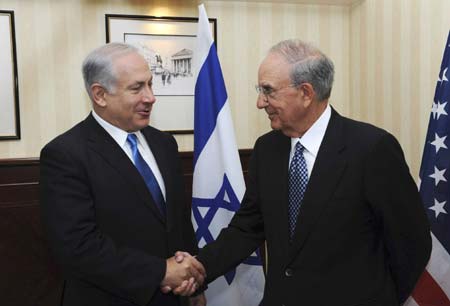By David Harris
Israeli Prime Minister Benjamin Netanyahu and US special envoy George Mitchell held talks lasting several hours in London on Wednesday. Those close to the discussions said progress was being made and there is general optimism that these talks will lead to the relatively early resumption of Israeli-Palestinian negotiations.
A joint statement issued at the end of the session said progress had been made and a further round of talks would be held next week.
 |
|
Israel's Prime Minister Benjamin Netanyahu (L) shakes hands with U.S. Middle East envoy George Mitchell during their meeting in London August 26, 2009, in this picture released by the Israeli Government Press Office (GPO). Netanyahu said on Wednesday his government was making progress towards reopening talks with the Palestinians and hoped to be able to do so shortly. [Xinhua]
|
Rumors are emanating from Washington, Jerusalem and Ramallah on Wednesday, suggesting the Palestinian and Israeli leaders are likely to meet in September.
One is that the two men will hold private talks during the opening of the 64th General Assembly of the United Nations, which begins on Sep. 15.
It is also being suggested, based on comments to reporters by Israel's ambassador to the United Nations Gabriella Shalev, that a three-way meeting will soon be held among Netanyahu, Palestinian leader Mahmoud Abbas and US President Barack Obama.
Before talking with Mitchell, Netanyahu met British Prime Minister Gordon Brown on Tuesday. Brown told reporters that he is now more optimistic about the chances for an Israeli-Palestinian peace deal than he has been for some time.
Settlement freeze
All of this speculation about progress towards direct negotiations points to the fact that agreement is apparently close between the US and Israel over the American demand that Israel "freeze all settlement activity."
The settlement issue has been a major stumbling block between the parties since they first held direct talks in the early 1990s. However, since Obama came into office in January, it has become apparent that the thinking in Washington is that this is now the paramount issue.
Indeed, Abbas has made it absolutely clear that there can be no negotiations until Israel ceases all construction in the West Bank.
Abbas and Obama say that building freeze should also apply to the Arab-dominated eastern side of Jerusalem, which the United Nations deems occupied territory. The Palestinians have earmarked eastern Jerusalem as the capital of their future state.
However, official Israeli policy is to speak of Jerusalem as "the indivisible capital of the Jewish state."
Despite this and other clear differences, there is recognition from all three parties that there is progress. Analysts are now considering what lies ahead.